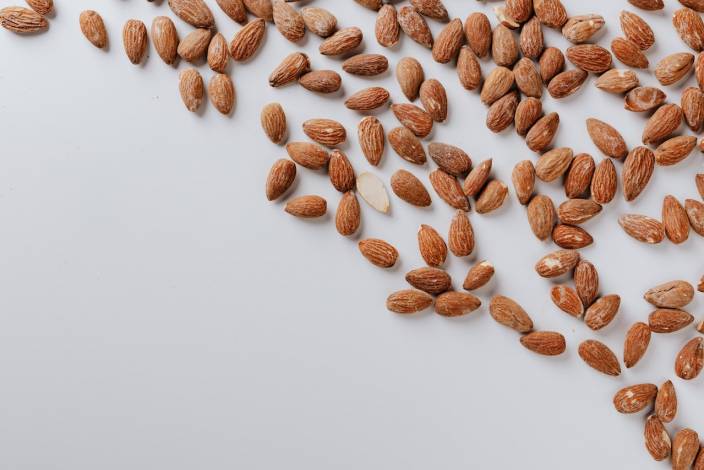Let’s explore 10 types of food rich in protein. Protein is a macronutrient, which is made up of chains of amino acids – when digested, proteins break down to amino acids inside our bodies. Proteins are essential for many functions of the human body, and therefore consuming enough of them can be vital for our overall health. Some of the important functions of proteins are building tissue and cells as well as muscles and bones (incl. skin and hair), creating hormones and anti-bodies, supporting the flow of blood, and more.
The following are some of the types of food that are rich in protein content:
Eggs
Eggs are great for protein intake. There are numerous ways of preparing and cooking them, which makes them perfect for a variety of dishes. One egg can provide around 6g of protein (depending on the size of the egg) and 13g per 100g, as well as many vitamins and minerals such as Vitamin A (equiv.), Vitamin B5, Vitamin B12, Choline, Vitamin D, Phosphorus, and many more.
Greek Yogurt
Greek yogurt is another good choice for consuming protein. 100g of Greek yogurt can contain between 5 and 10g of protein, depending on the type of brand. It is also full of other healthy nutrients such as Calcium, Iodine, Potassium, Selenium, Vitamin B2, Vitamin B5, and Vitamin B12.
Chicken Breast
Chicken breast is one of the top choices of food with high amount of protein. 100g of chicken breast contains around 30g. It is also a good source of Vitamin B3, Vitamin B6, Selenium, Phosphorus, and Iron.
Tofu
Tofu is an excellent choice of protein intake. The food is full of healthy nutrients and is derived from soya, making it a perfect and common choice for vegetarians and vegans. Tofu is contains high quantity of Copper, Manganese, Magnesium, Selenium, Calcium, Phosphorus, and antioxidants. 100g of tofu has between 10-15g of protein (depending on the brand).
Tuna
One of the best types of food rich in protein to choose from. A 100g of tuna has between 25-30g of protein, making it an excellent choice. Tuna also contains a good amount of Vitamin A (equiv.), Vitamin B3, Vitamin B12, Vitamin D, as well as Selenium, Magnesium, and Omega 3.
Pumpkin Seeds
Pumpkin seeds are full of protein, with around 30g of protein per 100g. They are also rich in antioxidants and many other nutrients: Vitamin B2, Vitamin B3, Vitamin B9, as well as Iron, Magnesium, Phosphorus, Manganese, and Zinc.
Turkey Breast
Turkey, the holiday special feast. The breast from turkey contains a huge amount of protein, roughly 30g per 100g. Turkey breast is a common protein-based dietary substitution of chicken breast. It also offers Vitamin B3, Vitamin B6, Vitamin B9, Choline, Selenium, Sodium, Phosphorus, and Zinc.
Lentils
Lentils are cooked in many different dishes. They are delicious as well as full of protein and other healthy nutrients. 100g of lentils contain around 9g of protein. The edible legume also offers vitamins and minerals such as Vitamin B1, Vitamin B5, Vitamin B6, Vitamin B9, Copper, Iron, Manganese, Phosphorus, and Sodium.
Almonds
Almonds are a very popular choice of protein intake. They are offer around 20g of protein per 100g. Almonds can be eaten in a variety of ways, from raw and heated to salads and desserts. They are loaded with healthy nutrition: Vitamin B2, Vitamin B3, Vitamin E, Copper, Magnesium, Manganese, Phosphorus, and many more. Almond oil contains a good amount of Omega-3 and Omega-6.
Beef
Beef is a great source of protein. 100g of beef can provide around 25g of protein. It also offers nutrients such as Vitamin B2, Vitamin B3, Vitamin B6, Vitamin B12, as well as good amount of Copper, Iron, Phosphorus, Selenium, and Zinc.
More on vitamins and minerals.
The following is a summary of the food rich in protein, listed in descending order.
Summary:
| Fruit | Protein (per 100g.) |
| 1. Chicken Breast | 30g |
| 2. Turkey Breast | 30g |
| 3. Pumpkin Seeds | 30g |
| 4. Tuna | 25-30g |
| 5. Beef | 25g |
| 6. Almonds | 20g |
| 7. Tofu | 10-15g |
| 8. Eggs | 13g |
| 9. Greek Yogurt | 5-10g |
| 10. Lentils | 9g |
Governmental recommendations:
- 55.5g (M) / 45.0g (F) – adults
Public Health England (PHE), United Kingdom (?) - 50.0g – adults
U.S. Food and Drug Administration (FDA), United States (?) - 64.0g (M), 46.0g (F) – adults
National Health and Medical Research Council (NHMRC), Australia & New Zealand Ministry of Health (MoH) (?)


